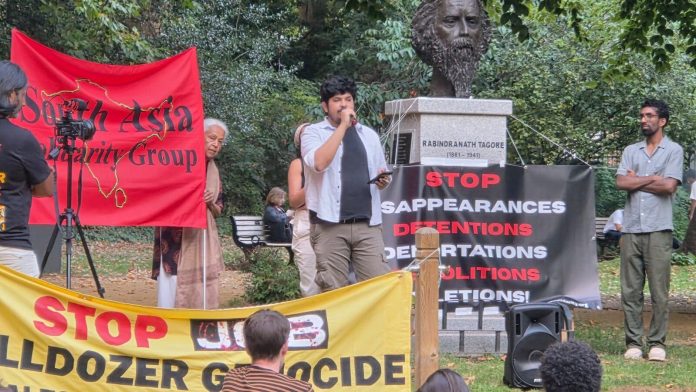London — On the occasion of the 78th anniversaries of India and Pakistan’s independence from British colonial rule, South Asian diaspora organisations staged a powerful protest in London, drawing attention to the ongoing persecution of Bengali Muslims, reported the Maktoob Media.
The demonstration, organised by the South Asia Solidarity Group along with other diaspora collectives, took place at the bust of Rabindranath Tagore in Gordon Square. Activists recited resistance poetry and sang revolutionary songs, emphasising the continued struggles faced by marginalised communities.
“Despite being Indian citizens, Bengali Muslims are subjected to detention, torture, home demolitions, and even deportation to Bangladesh. Entire Bengali-speaking working-class communities are being criminalised,” read a press statement released during the protest.
Speakers underlined that colonial oppression did not end in 1947 but merely shifted from foreign rulers to local elites, who continue to perpetuate violence, exclusion, and division. The protestors linked their solidarity not only with Indian Muslims, Dalits, and Christians but also with Palestinians, Sudanese people, and other persecuted communities worldwide.
The cultural repertoire of the protest featured works by Rabindranath Tagore, Sukanta Bhattacharya’s Abaak Prithibi, revolutionary poet Faiz Ahmed Faiz, and Kashmiri poet Ather Zia.
Demonstrators condemned the Hindutva-led Indian government for attacks on minorities, the revocation of Article 370 in Kashmir, attempts to impose Manusmriti in place of the Constitution, and the bulldozing of Muslim and Dalit homes with JCB machinery supplied by UK companies. They also highlighted the persecution of Bengali Muslims in Assam and beyond.
Pakistan too came under criticism, with speakers denouncing enforced disappearances in Balochistan and the large-scale deportation of Afghan refugees who had lived in Pakistan for decades without proper protection of their rights.
The event served as a moment of collective solidarity, with participants raising slogans for a Free Palestine and calling for cross-border unity in resisting oppression.
In a concluding statement, the South Asia Solidarity Group affirmed: “We gather here as part of the diaspora to commit ourselves to solidarity across borders, across identities, and against every system that thrives on division. As Tagore said, ‘I will never allow chauvinism to triumph over humanity for as long as I live.’ Our struggles must remain connected because our histories are intertwined.”




